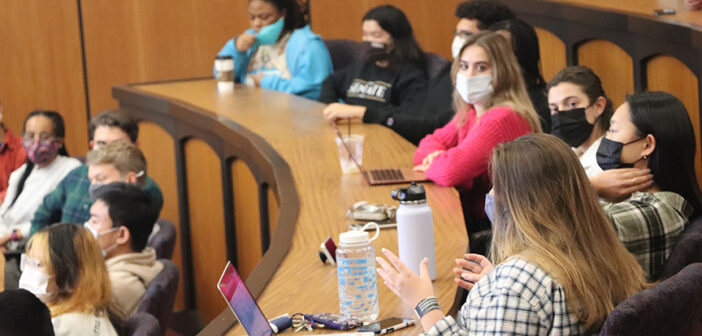When Isabela Giraldo, ‘25, arrived at Lehigh, she and her roommate noticed litter on campus and felt inclined to take action.
To do so, she formed the Litterbug Club, which strives to keep Lehigh’s campus litter free through direct action and student engagement.
Although conceptualized in the fall of 2022, Giraldo’s club did not submit an application until spring 2023, a delay caused by the fact that Giraldo did not know a club could be “Student-Senate approved.”
“I was thinking, ‘Oh, we’ll just start a club. It’ll be easy,’” Giraldo said.
The club has now been approved by Senate.
The Litterbug Club is one of about 300 active clubs on Lehigh’s campus. There is a Student Senate committee dedicated solely to club affairs.
Club affairs chair Emily Wegrzyn, ‘24, said the Senate issues a wave of club approvals three times in an academic year, two during the fall semester and one at the beginning of the spring semester.
Wegrzyn said approvals for the last wave were decided the week of April 17.
“All around, it’s about an eight-week process, with a six-week trial period in the middle and one week on either end for Senate deliberations,” Wegrzyn said.
Giraldo said the first step of creating a Senate-approved club is submitting an application through Lehigh Involvement Connection, Lehigh’s online center for campus involvement.
She said after sending in her application, she gave a 20-minute presentation to a panel of student senators to explain why the Senate should approve the club.
After initial presentations, Wegrzyn said clubs can be approved for a trial period.
“We really loved (the Litterbug Club’s) idea,” Wegryzyn said. “So we sent a recommendation for approval.”
Student senator Ellie Crummy, ‘26, said the Club Affairs allocation committee gives the clubs $100 during this period so they can fund events and meetings. This money comes from the Student Life Series Fund, which Lehigh administration provides.
Giraldo said at the end of a club’s six-week trial period, they present to the Senate once again, detailing what they accomplished during that time.
“As long as they have active members during their trial period, have a full (executive) board and do everything that’s in the guidelines that Club Affairs gives them, they tend to get recognized,” Crummy said.
She said the main reasons a club would not gain approval are safety concerns, asking for too much funding or if the club’s trial period accomplishments were not substantial.
Giraldo said for the Litterbug Club, Senate members had safety concerns relating to legal issues while picking up hazardous items.
Wegrzyn said she and the rest of the Club Affairs Committee recommended the Litterbug Club to the Campus Events Advisory Group.
“We’ve been seeing a lot of interest in the (Litterbug) club, which we always love,” Wegrzyn said. “We just wanted to make sure that they had proper advising, and the (Campus Events Advisory Group) had great ideas for that.”
Wegrzyn said it’s common for clubs to meet with the Campus Events Advisory Group, citing the Lightsaber Club as an example. She said for clubs that include physical activity, the advisory group knows more about safety than the Senate does.
Giraldo said the group set her up with a South Side ambassador who helped her create safety guidelines and procedures.
If clubs are approved following their second presentation, Wegrzyn said, they become official Senate-recognized clubs.
“Once you’re a fully approved club, that’s when you are able to start submitting funding requests to Student Senate,” Wegrzyn said. “We can start giving you money to support your events, your ideas, your collaborations.”
Clubs also get a Lehigh Involvement Connection page after approval. Giraldo said this allows them access to more resources and the ability to book meeting locations and become recognized as an official Lehigh club.
According to the Lehigh Involvement Connection website, all Lehigh students can use the platform to access event calendars, club meetings, peer education programs, and the Panhellenic and Cultural Greek councils, among other groups.
“We really try to approve as many clubs as possible,” Wegrzyn said. “Something that I keep in mind, that I really stress to the committee, is just because you don’t feel a need to be in that club does not mean nobody on this campus does.”






Comment policy
Comments posted to The Brown and White website are reviewed by a moderator before being approved. Incendiary speech or harassing language, including comments targeted at individuals, may be deemed unacceptable and not published. Spam and other soliciting will also be declined.
The Brown and White also reserves the right to not publish entirely anonymous comments.